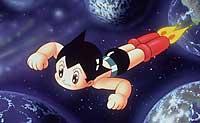Anime classic 'Astro Boy' returns with new episodes
Most young viewers aren't familiar with "Astro Boy," the popular cartoon robot from the 1960s. But without him, they might not have enjoyed such current animated favorites as "Pokemon" and "Dragon Ball Z."
 Forty years after it was a Saturday-morning hit, "Astro Boy" is back, with new episodes starting Jan. 17 at 8:30 a.m. on The WB (KTWB).
Forty years after it was a Saturday-morning hit, "Astro Boy" is back, with new episodes starting Jan. 17 at 8:30 a.m. on The WB (KTWB).
The original TV series, based on the comic-book character created by artist Osamu Tezuka 50 years ago, was the first Japanese cartoon — or anime — to be imported to America.
Astro Boy's oval eyes and spiky hair defined the look of today's anime favorites.
"He's as popular as Mickey Mouse and Bugs Bunny worldwide," John Hardman, senior vice president for Kids WB.
While Astro Boy hasn't been seen in the United States since a short-lived revival in the 1980s, Hardman said the character is recognizable to children who have long seen toys and memorabilia on store shelves.
"Astro Boy" is a space-age version of "Pinocchio." Set 50 years in the future, it concerns a robot created by Japan's minister of science that is designed to replicate his young son, who died in a car accident.
Once the grieving father realizes the boy robot won't grow up, it's sold to a circus. Another scientist — named Dr. O'Shay in the new series — rescues Astro Boy and teaches him to use his powers for good.
While Astro Boy can fly, has lasers in his fingers and has 100,000-horsepower strength, he also has the emotions and impulses of a 9-year-old boy. The combination often gets him into trouble. Longtime fans will notice differences, however.
"Not until episode six or seven will he realize he is based on a real boy," said D'Ambrosia. "We're letting the kids discover his destiny and his journey with him."
While the new "Astro Boy" is being created for viewers around the world, D'Ambrosia is making sure it is appropriate for young viewers in the United States.
It's a process that writer-producer Fred Ladd understands. Forty years ago, after doing voices for numerous European cartoons, he was hired by NBC's syndication arm to translate the first "Astro Boy" for American audiences.
The show was intensely violent, although most of the destruction was of other robots. Still, Ladd often had to alter Japanese dialogue to make the show palatable here.